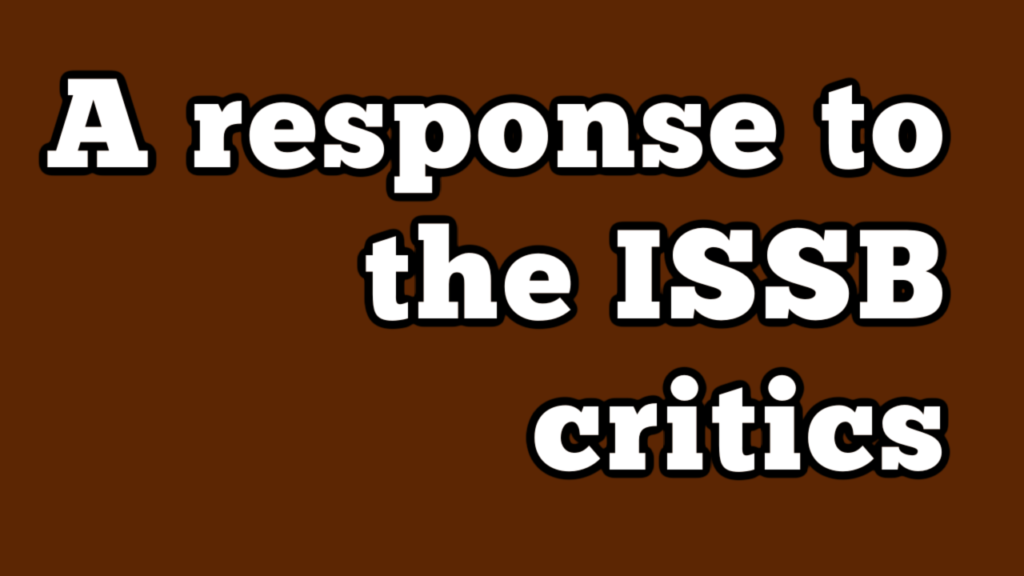A response to the critics of the International Sustainability Standards Board

Here’s the intro from an article from Bob Eccles published in “Forbes”:
I should have seen the hate mail coming. In October 2018 my Oxford colleague Professor Richard Barker and I published a Green Paper titled “Should FASB and IASB be responsible for setting standards for nonfinancial information?” Much to our surprise and delight, just two years later in September 2020 the Trustees of the IFRS Foundation published their “Consultation Paper on Sustainability Reporting.” The idea was to establish an International Sustainability Standards Board (ISSB), parallel and coordinated with the International Accounting Standards Board which sets standards for financial reporting for most of the world. The U.S. has its own version called U.S. Generally Accepted Accounting Principles but they really aren’t all that different.
Even before the consultation period for the ISSB had closed I got the first inkling of the problems to come. Professors Carol Adams and Charles Cho wrote a biting article targeted at Barker and me titled “Sustainable development is too important for self-interest and political posturing.” Ah, the niceties of academic discourse! Their basic argument was that we didn’t need an ISSB since the Global Reporting Initiative had already done this work. Stripping away their angry rhetoric, the core issue is “single vs. double materiality,” a phrase arcane to anyone that is not involved in the sustainability reporting standards wars.
Simply put, the issue is whether companies should report on sustainability issues that are relevant to value creation and directed at investors or whether they should also report on issues that may not be relevant to value creation, perhaps even relevant to value destruction, but are about externalities making the world a better or worse place. For sure an important issue and one worthy of ongoing dialogue and debate. The issue is how to make this conversation a constructive one.
Sadly, this is not turning out to be the case amongst many in the double materiality camp. In July I wrote about how the ISSB is turning out to be an ideological Rorschach test. Those on the Extreme Right don’t think it should exist at all. In the U.S. they don’t even want basic disclosure on carbon emissions, either because they don’t believe climate change is happening or they don’t think companies should have any responsibility for addressing it or for even crazier reasons I cannot fathom.
Those on the Extreme Left are, if anything, even more furious. For them it doesn’t go nearly far enough. They despise the name since it’s not about “true sustainability” and thunder against using ESG and sustainability as synonyms. Best as I can tell they’d rather it didn’t exist at all. It feels a lot like the super liberal wing of the Democratic Party that would rather have no legislation at all if they can’t have everything they want at whatever cost to the American public.
I will get into the “ESG vs. sustainability” issue in more detail, but a bit of historical perspective is useful. I have been thinking about and working on standards for ESG/sustainability (I hear the outrage echoing in the background) for longer than anyone I know, like 30 years. In fairness, this is probably more due to age (I’m 70) than perspicacity but work on something long enough and with a little luck progress starts to be made. Which it has been.
The Green Paper by Barker and me was the basis of an excellent and thoughtful heated debate in December 2018 at the Oxford Union about whether regulated standards or market forces was the best way for investors to get information about a company’s sustainability performance. While the “Ayes” in favor of regulation carried the day about two-to-one, it was far from a unanimous vote.
The IFRS Consultation two years later was a clear signal of how quickly things had changed. A year ago I noted how the narrative around sustainability reporting had rapidly changed from one of “market forces will take care of this” to “we need regulation, just like we have with financial reporting.” Bhakti Mirchandani, who also has a column on Forbes.com, wrote about why the formation of the ISSB, announced in November at COP 26, is such an important event. I was so excited!
Of course I knew there were skeptics and naysayers but the full fury of their ire became even more apparent when Mirchandani and I published our little piece “We Need Universal ESG Accounting Standards” in the Harvard Business Review on February 15,2022. We saw this as a great opportunity. Barker and I had written about the importance of investor support for the ISSB. A piece in HBR would give Mirchandani and me the opportunity to make the case for companies. We’re thinking, “Gosh, how great to have the HBR platform to get this message out to a mainstream business audience. Most of whom probably haven’t heard about the ISSB but all of whom are struggling with how to report on sustainability. This will be good and and welcomed news for them.” Step-by-step, right? Start with Course 101. Then 201, 301, 401 and for those who want to become experts get a PhD. Like I have. From Harvard. After two degrees from MIT. In four years.
I’m of the increasingly quaint notion that it’s important for the message match the audience if you’re trying to persuade them of your view. Some audiences need the basics without being belittled and shamed. Simplification will be necessary, simplification that is creating major heartburn for those who pride themselves on being able to debate the differences between single/double/dynamic/contextual materiality, ESG vs. sustainability, and purpose vs. sustainability. Ummm. I know all of this stuff pretty well but that’s not relevant when I’m trying to create awareness and move hearts and minds in the broad business and investment communities. Where, if you’ll forgive me for saying so, I’m pretty well known and well connected.
